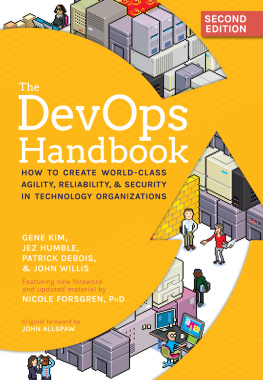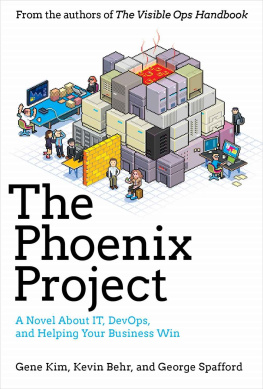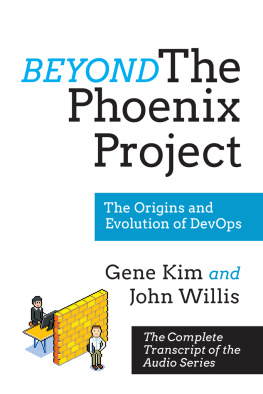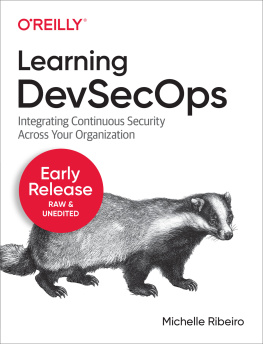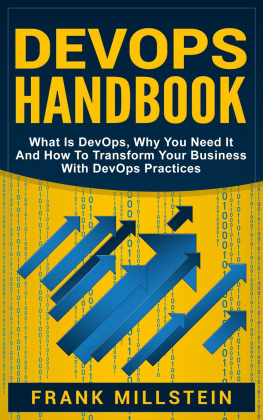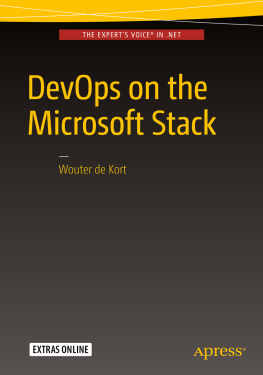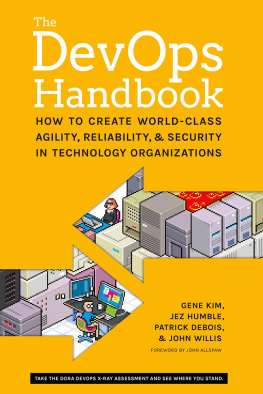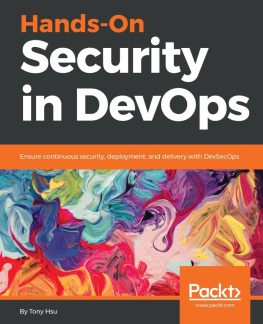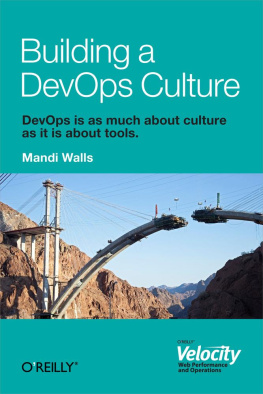Front Matter

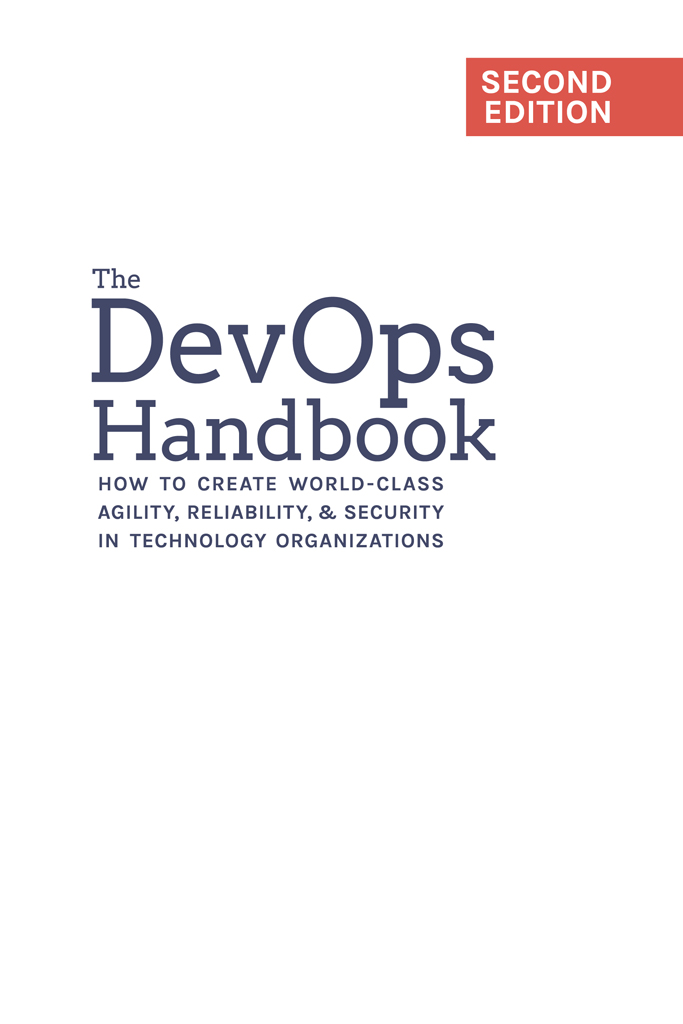
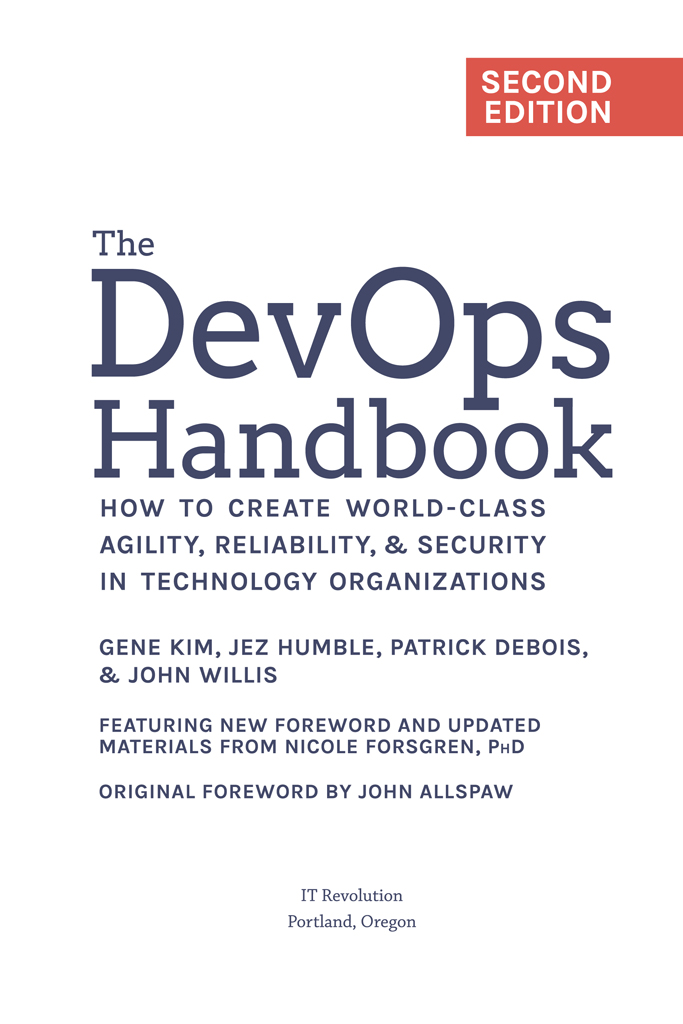

25 NW 23rd Pl, Suite 6314
Portland, OR 97210
All rights reserved. For information about permission to reproduce selections from this book,
write to Permissions, IT Revolution Press, LLC,
25 NW 23rd Pl, Suite 6314, Portland, OR 97210
The DevOps Handbook, Second Edition 2021 by Gene Kim, Matthew "Jez" Humble,
Patrick Debois, John Willis, and Nicole Forsgren
First edition 2016 by Gene Kim, Jez Humble, Patrick Debois, and John Willis
Printed in the United States of America
27 26 25 24 23 22 211 2 3 4 5 6 7 8 9 10
Cover design by Devon Smith Creative
Cover illustration by eboy
Book design by Devon Smith Creative
ISBN: 9781950508402
eBook ISBN: 9781950508433
Web PDF ISBN: 9781942788867
Audio ISBN: 9781950508440
The author of the 18F case study has dedicated the work to the public domain by
waiving all of his or her rights to the work worldwide under copyright law, including all related
and neighboring rights, to the extent allowed by law. You can copy, modify, distribute, and
perform case study 18F, even for commercial purposes, all without asking permission.
For information about special discounts for bulk purchases
or for information on booking authors for an event,
please visit ITRevolution.com.
THE DEVOPS HANDBOOK, SECOND EDITION
CONTENTS
FIGURES & TABLES
NOTE FROM THE PUBLISHER ON THE SECOND EDITION
Impact of the First Edition
Since the original publication of The DevOps Handbook , data from the State of DevOps Reports and other research continue to show that DevOps improves time to value for businesses and increases productivity and worker well-being. It also helps create nimble, agile businesses that can adjust to overwhelming change, as witnessed in the COVID-19 pandemic of 2020 and beyond.
I think 2020 has been illuminating in showing what technology can do in a time of incredible crisis, Gene Kim said in his State of DevOps: 2020 and Beyond article. The crisis provided a catalyst for rapid change. And Im thankful we were able to rise and meet it.
One of the underpinnings of DevOps and The DevOps Handbook is that it showsand is indeed written forthe horses not the unicorns of the business and technology world. DevOps was never, and still is not, only effective at technology giantsthe FAANGsor startups. This book and the DevOps community as a whole have shown time and time again that DevOps practices and processes can take even the most legacy-riddled, old horse enterprise organization and turn it into a nimble technology organization.
In 2021, it is clearer than ever before that every business is a technology business and every leader is a technology leader. Not only can technology no longer be ignored or relegated to the basements; it must also be considered a vital part of the entire strategic endeavor of the business.
Changes to the Second Edition
In this expanded edition of The DevOps Handbook , the authors have updated the main text where new research, learnings, and experiences have developed and shaped our understanding of DevOps and how it is used in the industry. Additionally we are pleased to include renowned researcher Dr. Nicole Forsgren as co-author to help update and expand the text with new research and supporting metrics.
Continuous Learning
Weve added some additional insights and resources weve learned since the first edition came out. These Continuous Learning sections are highlighted throughout the book as you see here and include new supporting data and additional resources, tools, and techniques to use on your DevOps journey.
Weve also expanded the book with additional case studies to illustrate how far DevOps has spread throughout all industries, especially how it has spread beyond the IT department and into the C-suite itself. In addition, at the end of each case study we have added a key takeaway or two that highlight the most important, though not exclusive, lessons learned. Finally, weve updated the conclusion to each part with new resources to continue your learning journey.
Whats Next for DevOps and the Age of Software
If the past five years have taught us anything, it is how important technology is and how much we can achieve when IT and the business speak openly and honestly, as DevOps facilitates.
Perhaps nothing illustrates this more than the rapid changes that were necessary due to the COVID-19 pandemic of 2020 and beyond. Through the use of DevOps, organizations mobilized technology to get services to customers, internal and external, in a moment of rapid, unprecedented change. These large, complex organizations, known for their inability to pivot and adapt quickly, suddenly had no other choice.
American Airlines also was able to take advantage of their ongoing DevOps transformation to build big wins quickly, as you can read about in .
Dr. Chris Strear relates his experiences using the Theory of Constraints to optimize flow in hospitals, as you can read about in .
In 2020 Nationwide Building Society, the worlds largest mutual financial institution, was able to respond in weeks to customer needs versus the typical years, thanks to their ongoing DevOps transformation. You can read more about their experience in .
But while technology is a piece of a successful transformation into future ways of working, business leadership must lead the charge. The bottleneck of today is no longer just technical practices (though they still exist); the biggest challenge and necessity is getting business leadership on board. Transformation must be co-created between the business and technology, and the theories presented here can lead that change.
The enterprise can no longer sustain a binary thought process: top down or tech only. We must achieve true collaboration. Ninety percent of that work involves getting the right people engaged, onboard, and aligned. Start there and we can maintain the resulting motivation into the future.
IT Revolution
Portland, OR
June 2021
FOREWORD TO THE SECOND EDITION
I t has been five years since the first edition of The DevOps Handbook was released. While so much has changed, so much has also remained the same. Some of our tools and technologies are no longer in vogue or might not exist, but that shouldnt detract any readers. Although the technology landscape has shifted, the underlying principles presented in this book remain as relevant as ever.
In fact, the need for DevOps is even greater today, as organizations need to deliver value quickly, safely, securely, and reliably to their customers and users. To do this, they need to transform their internal processes and leverage technology to deliver valueusing DevOps practices. This is true for organizations around the world and across all industry verticals.
Over the past several years, Ive led research in the annual State of DevOps Reports (first with Puppet and later with DORA and Google), with co-authors Jez Humble and Gene Kim. The research has confirmed that many of the practices described in this book lead to improved outcomes like speed and stability of software releases; reductions in deployment pain and burnout of our engineers; and contributions to organizational performance, including profitability, productivity, customer satisfaction, effectiveness, and efficiency.

